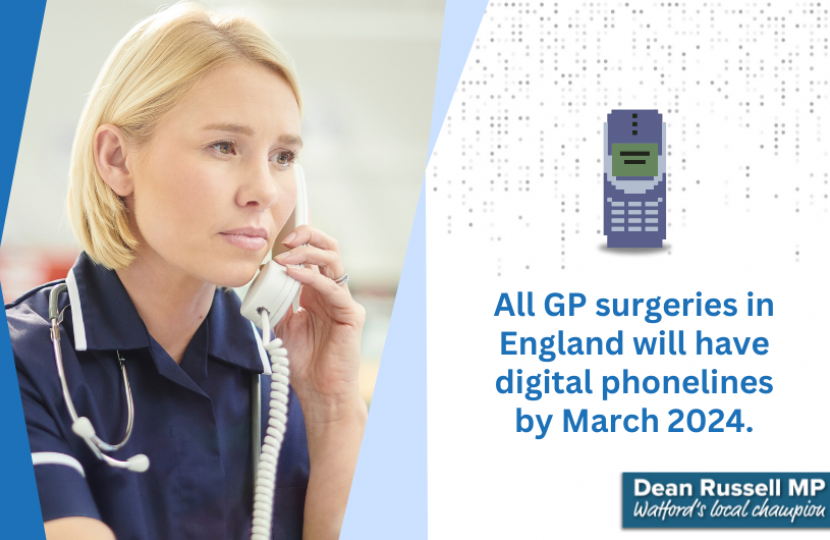
Patients at all general practices across England will soon benefit from new digital phonelines designed to make booking GP appointments easier.
Backed by a £240 million investment, more than one thousand practices have signed up to make the switch from analogue systems which can leave patients on hold and struggling to book an appointment – to modern, easy-to-use digital telephones designed to make sure people can receive the care they need when they need it.
It is expected every practice in the country will have the new system in place by the end of this financial year helping put an end to the 8am rush - a key pillar of the Prime Minister’s Primary Care Recovery Plan to improve patient access to care.
Patients will be able to contact their general practice more easily and quickly - and find out exactly how their request will be handled on the day they call rather than being told to call back later, as the government and NHS England delivers on the promises made in the Primary Care Recovery Plan announced in May. If their need is urgent, they will be assessed and given appointments on the same day. If it is not urgent, appointments should be offered within two weeks, or patients will be referred to NHS 111 or a local pharmacy.
The upgraded system will bring an end to the engaged tone, see care navigators direct calls to the right professional and the use of online systems will provide more options and help those who prefer to call to get through.
The government also committed up to £645 million in the plan to better utilise community pharmacies. A consultation will soon be launched to enable registered pharmacy technicians to supply and administer medicines helping them take on more responsibility and speed up the dispensing of medicines to patients.
A second consultation is also being launched looking at how dental hygienists and therapists can be better supported to provide additional care to patients and reduce unnecessary delays. This is ahead of a dental recovery plan which is due to be announced shortly.
Practices on older systems will receive an average investment of £60,000 each to move onto digital phones combined with updated digital tools and support for the transition.
Primary care is the way most people access the NHS and the government is committed to modernising the way patients contact their GP surgeries – improving satisfaction and delivering on the Prime Minister’s promise to cut waiting lists.
Successful care navigation can help direct 40% of requests more effectively and speeds up appointments for those who need them so care navigators will direct patients to other professionals within the practice or other medical professionals such as community pharmacists who can best meet the needs of the patients.
The government has already started training care navigators, with funding for 6,500 places –the equivalent of one member of staff per practice who can then pass on the training to colleagues. They will help assess, prioritise, respond and assist with calls and ensure those who want to see a named GP or preferred member of staff can do so and those happy to see a duty doctor can also do so.
Building on the Long-Term Workforce Plan, the government’s plans to better utilise the skills of pharmacy technicians and dental hygienists will free up time for pharmacists and dentists to carry out clinical services.
Maximising the use of the skill mix in pharmacy teams will help them better meet the health needs of their customers, deliver more patient-facing clinical services, improve access to care and release capacity in the wider NHS.
Working in partnership with the sector this consultation will examine how to make best use of pharmacy technicians’ and make it easier for patients to access medicines in a simpler but still safe way.
The dental consultation includes a similar proposal to enable dental hygienists and dental therapists to supply and administer specific medicines under exemptions without the need for a prescription.
Progress is also being made on other aspects included in the Primary Care Recovery Plan with discussions taking place between the government, NHS England and the pharmaceutical sector about the best way to use the up to £645 million of funding allocated to the pharmacy sector.
This includes work to ensure patients who need prescription medication for seven common conditions can receive it without the need for a GP appointment.
Almost half a million women will no longer need to speak to a practice nurse or GP to access oral contraception and will instead be able to access it from their local pharmacy.
Tens of thousands more people will be at lower risk of a heart attack or stroke, with the NHS more than doubling the number of people able to access blood pressure checks in their local pharmacy. The target is for 2.5 million tests each year, up from 900,000 carried out last year.
The actions set out in the plan are expected to free up around 15 million GP appointments over the next two years for patients who need them most.


